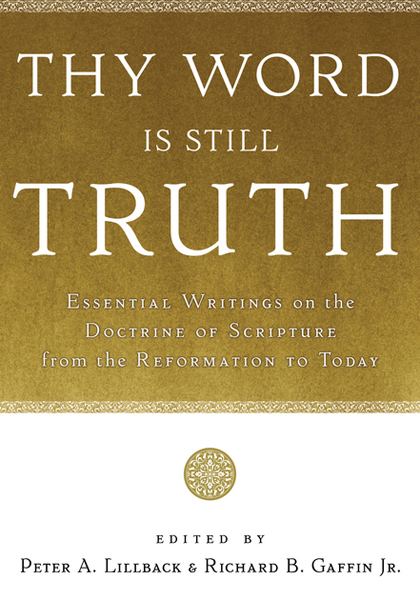
Peter A. Lillback & Richard B. Gaffin, Jr., Ed.
Reviewed by: Ryan M. McGraw
Thy Word Is Still Truth: Essential Writings on the Doctrine of Scripture from the Reformation to Today, edited by Peter A. Lillback and Richard B. Gaffin, Jr. Published by Westminster Seminary Press and P&R Publishing, 2013. Hardback, 1,424 large pages, list price $59.99. Reviewed by OP pastor Ryan M. McGraw.
Since the creation of the world, Satan has attacked the doctrine of Scripture vigorously. He tempted Eve to doubt God's Word, and he has done so ever since. Questioning the inspiration, authority, sufficiency, and other attributes of Scripture lies behind most heresies and apostasies in the history of the church. Maintaining a biblical doctrine of Scripture is essential to the very being of Christianity and to our communion with the triune God and spiritual vitality.
Thy Word Is Still Truth is a massive compendium (sixty-four chapters) of Reformed teaching from Martin Luther to the present day. The editors introduce each chapter with a brief historical introduction in order to demonstrate the importance of the selected material. Roughly half of the book covers the sixteenth and seventeenth centuries. The remainder of the work divides authors by century and country, with a special emphasis on writings by professors at Westminster Theological Seminary (pp. 895–1347). This last section reflects the fact that one of the overarching purposes of this book is to underscore the seminary's strong stance on the Reformed doctrine of Scripture. The title of the book is itself adapted self-consciously from E. J. Young's book Thy Word is Truth (1957) (p. xiii).
The primary strength of this book is that it is a large collection of much of the best Reformed literature on the doctrine of Scripture. It includes the most well-known names in the Reformed tradition. This gives readers a taste of the primary teaching of the Reformed tradition on this subject. Moreover, the large section that includes present and past faculty from Westminster Seminary makes a clear statement regarding where the seminary stands on this vital issue. This material covers recent controversies that have surrounded former faculty members at the seminary.
The weaknesses of the book mirror its strengths. By choosing the most well-known Reformed authors on Scripture, the editors limited their resources to the most readily available material. With the exception of a handful of chapters, this reviewer already owns almost all of the works cited. For example, most of the section on Reformed orthodoxy comes from Francis Turretin's Institutes of Elenctic Theology. This is an outstanding selection, but it would have been helpful to include instead significant authors that readers may not otherwise know of, such as Edward Leigh or John Downame. For a volume of this size, it would have been useful as well to include pre-Reformation authors in order to give a more robust representation of church history. However, for those with smaller libraries or who want a single volume of primary sources on the Reformed doctrine of Scripture, these features will not be a weakness.
May the Lord use this book as an essential Reformed reader on the doctrine of Scripture and may he strengthen the faith of the church as a result.
November 16, 2025
November 09, 2025
November 02, 2025
October 26, 2025
October 19, 2025
October 05, 2025
Raising Sexually Faithful Kids and
Parenting Boys and Girls in a Gender-Confused World
September 28, 2025
© 2025 The Orthodox Presbyterian Church